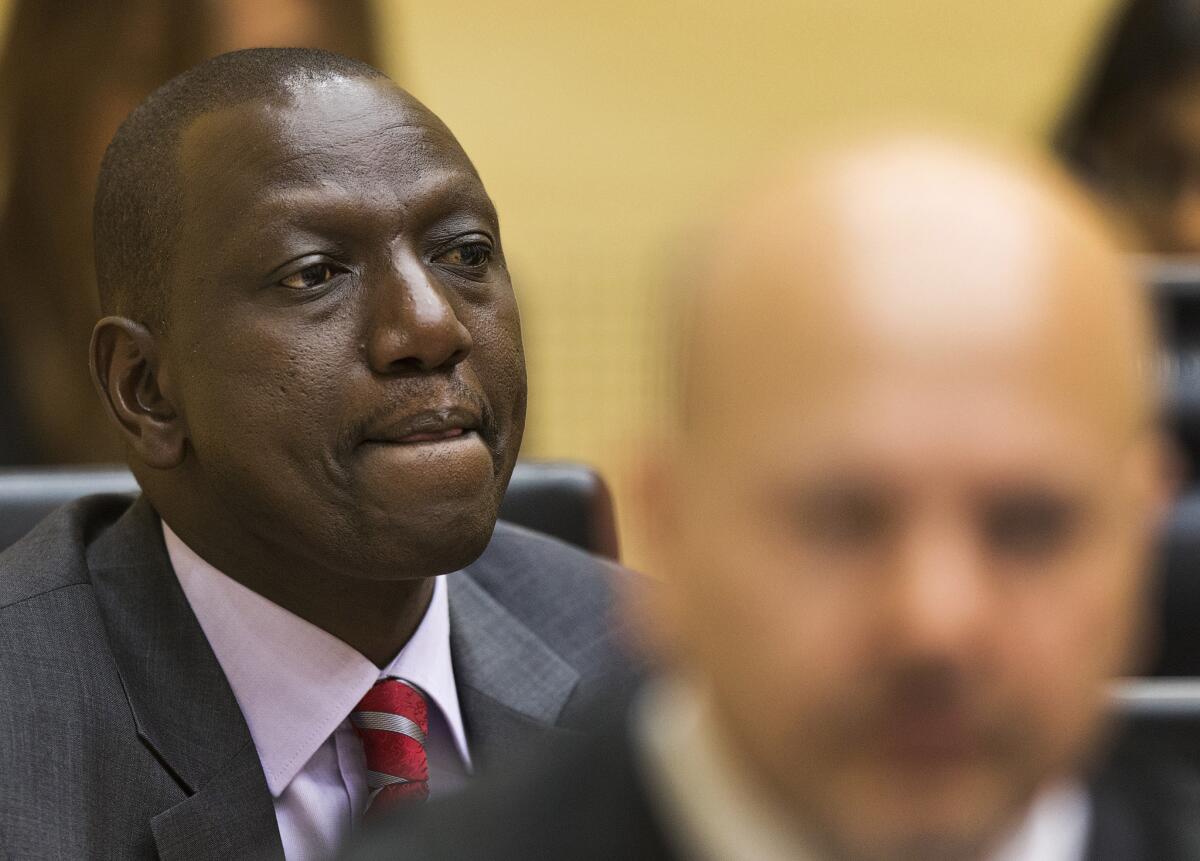First witness testifies in Hague trial of Kenya’s deputy president

- Share via
JOHANNESBURG, South Africa — An anonymous Kenyan woman made history Tuesday as the first witness to testify against a sitting government leader at the International Criminal Court in the Hague. The woman, known simply as Witness 536, testified for the prosecution against Kenyan deputy president William Ruto in the ICC’s biggest test in its 11-year history, its first attempt to try a current government leader.
To Kenyans watching the video transmission, Witness 536 appeared as nothing more than a swirl of pixilated colored squares, her identity kept secret to protect her from attack.
Ruto is accused of crimes against humanity for allegedly orchestrating ethnic violence and killings after the disputed 2007 elections. More than a thousand people died nationally in the violence. Kenya’s president, Uhuru Kenyatta, faces similar charges and goes on trial in November.
The witness’ testimony was chilling Tuesday: She told the story of Jan. 1, 2008, when several thousand men armed with machetes, axes and sticks surrounded a wooden church in Kiambaa where women and children had taken refuge from ethnic violence that followed the election dispute.
In an attack that sent shockwaves around the world, the men burned down the Kiambaa church, killing up to 35 people. Witness 536, who had some of her children with her, was one of the survivors.
The church was completely full of women and children from the Kikuyu ethnic group, she said. “Enemies” from the Kalenjin tribe approached from two sides, singing.
She said many had their faces painted with white clay, making it hard to recognize them.
“Some of them were wearing leaves, others had pieces of cloth on their faces. Others were bearing traditional weapons such as machetes and axes and sticks .... They were Kalenjin,” she said.
The testimony of Witness 536 comes as successive key witnesses in the case against Ruto have withdrawn, while the ICC prosecutor Fatou Bensouda has complained of unprecented interference and threats against witnesses. Four witnesses withdrew just before the trial, and several more have withdrawn in recent days, prompting speculation that the prosecution’s case could be undermined.
Bensouda said last week the prosecution was investigating cases of witnesses being bribed to withdraw their evidence, warning of tough penalties.
Kenyan media reports suggest that some witnesses say they were under intense family and community pressure to pull out of the trial, which is severely embarrassing for Kenya’s government.
Meanwhile Kenyan and African leaders have instituted a campaign to have the trial stopped. Kenya has unsuccessfully called on the U.N. Security Council to halt the trials, while the African Union is planning a special summit meeting on the ICC in October, according to Kenyan media reports. African leaders are also expected to bring the issue next week to the U.N. General Assembly, which Uhuru reportedly will attend.
Witness 536 said that at the end of December 2007, Kikuyu people in her area heard that trouble was coming and fled their homes in the middle of the night to take refuge at the church in Kiambaa.
“The enemies were coming. They were singing. At that time the adults advised us to get into the church,” she said.
“The church was full. There were the women from Kiambaa and there were children too.... There were stones being thrown and arrows being thrown at the windows from all sides,” she said.
She said saw one man whose face was visible, Stephen Chemalan, holding a blue gasoline can. He was at the center of the group of youths setting the church on fire.
“Where he was, there were people setting fire to the church. He was in the middle of these people. He was in the middle of these people, but one could see him clearly,” she said.
The trial continues.
ALSO:
Pure reason: Russian shot in debate over philosopher Kant
In Syria’s capital, war surrounds residents living in a bubble
Colombia to pay Ecuador $15 million to settle coca herbicide suit
Twitter: @latimesdixon
More to Read
Sign up for Essential California
The most important California stories and recommendations in your inbox every morning.
You may occasionally receive promotional content from the Los Angeles Times.










